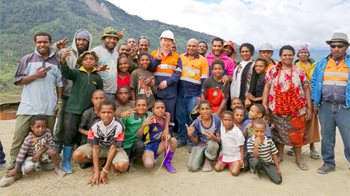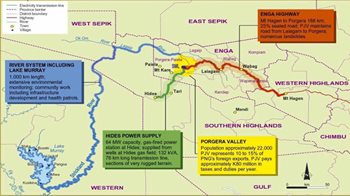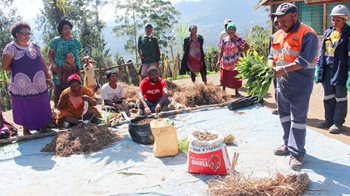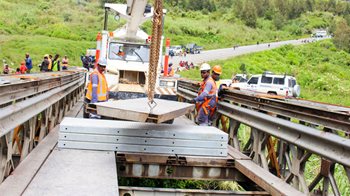Communication with Stakeholders
Communication and Engagement with stakeholders is managed under the Porgera Joint Venture (PJV) Corporate Social Responsibility (CSR) Social Management and the Stakeholder Engagement Management plans. The PJV governance structure allows for direct internal engagement and reporting to the Executive Managing Director.
Community Relations

Operating in a socially responsible manner is critical to maintaining PJV's licence to operate in PNG. It is committed to making a positive difference in the communities in which it lives and works, in creating opportunities to generate greater value and fostering sustainable development.
Community Relations and Engagement (CR&E) is an integral part of PJV and provides the interface between the host communities and the Company.The primary function is to promote company/community stakeholder engagement through open and honest communication that works to build trust, respect and transparency. This is considered to be the cornerstone of securing the social license for PJV operations.
The Porgera Mine's Footprint

The Porgera Mine site comprises the Special Mining Lease (SML), the Lease for Mining Purpose (LMP), the mining easements (water lines routes, dams etc.) as well as the public easements (airport, townships etc.).The open pit and underground mines operate on the SML. The SML was negotiated in 1989 between the Porgera Joint Venture (PJV), the seven landowning clans, the Enga Province and the PNG Government.The mine's footprint areas cover the mining areas as well as areas and communities along the Lae-Porgera Highway, the Hides to Porgera power transmission route and the Riverine tailings disposal system. PJV's community stakeholders are diverse and cover a large geographic area, in fact, the mine's footprint areas cover many different provinces in the Highlands, Momase and Southern regions of PNG. Each stakeholder group comes with its own distinctive cultural and ethnic diversity, this can make community relations and engagement work extremely challenging.This challenge is further compounded by the in-migration of people from outside the Porgera District, who also come with their own cultural identity and world views. In-migration and population growth has resulted in issues such as deterioration in law and order and increased pressure on existing social services, a dilemma that is not unique to our operational footprints.
Community Development

Engagement and support for development of small to medium size community businesses is managed under the PJV Community Development Management Plan. Emphasize is on creation of sustainable partnerships and programs that bring about social benefits, under the following pillars: Livelihood and Wellbeing, and Economic Programs and Women's Development.
Engagement on emphasize has also been on development and execution of Agricultural Training Programs, Water Security Projects, development of a partnership with government (National Agricultural Research Institute) focusing on pathogen and genetic testing of food crop varieties, introduction of agricultural programs in schools, Personal Viability training, Economic Development and Small Business Support programs.
These programs are ongoing and will continue during 2017 in alignment with the United Nation's Development Goals for poverty alleviation.
Land Access
The PJV CSR structure includes a dedicated Land Access and Management function. Legal and social obligations to pay compensation or relocate customary landowners are managed by this group. PJV has also commenced a pilot project to consider the viability of Resettlement as an option to existing relocation programs.
Procurement of goods and labour required to support PJV community development initiatives are sourced under the PJV Local Procurement Standard and Buy Local Policy.
Delivering on Tax Credit Scheme

The Tax Credit Scheme (TCS) is a PNG Government funding scheme introduced in 1992. It allows mining, petroleum and primary industry developers to cost effectively deliver capital projects and undertake maintenance of infrastructure on behalf of the Government in isolated regions through a tax credit arrangement. PJV was registered to and has been a participant of the scheme since 1992. Projects are undertaken primarily in impact arears where PJV operates in Enga, Hela, Southern Highlands and Western provinces as well as in some areas in other provinces. PJV has on average spent about US$2.8 million annually on TCS approved funded projects.The Government recommended projects undertaken are aligned with the Government's development priority areas of (1) Primary Health Care, (2) Universal Primary Education, (3) Transport and Infrastructure maintenance, and (4) a Safe and Secure Environment and respect for the rule of law.
TCS is managed by the PJV Community Projects unit under the Capital and Business Improvement Department.